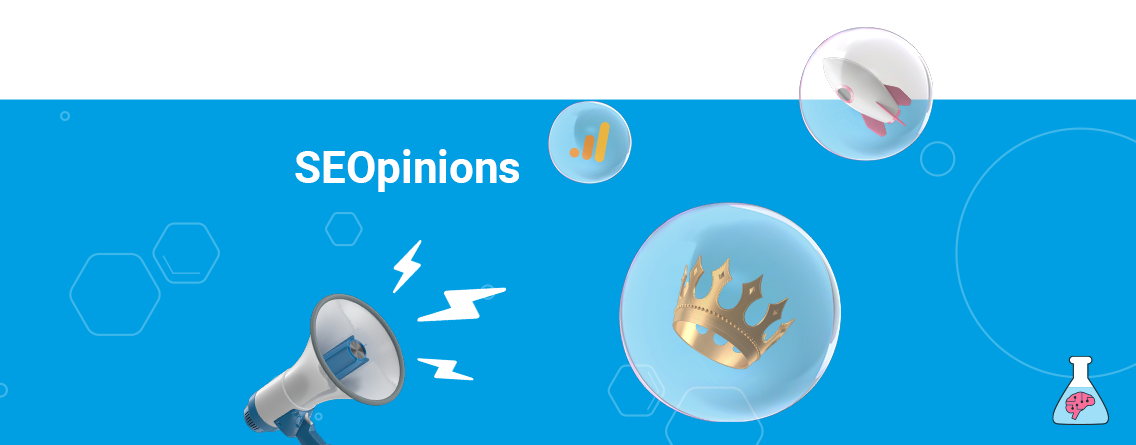SEOpinions Q3 2022 – TikTok SEO, E-A-T, and GA4
- With all the noise in the SEO industry, it can be hard to know what to prioritize. SEOpinions is a quarterly guide by Brainlabs to cut through the cruft, inform you of important SEO updates, and predict upcoming changes so you can prioritize your SEO roadmap accordingly. Read last quarter’s edition here.
1. A new world of search is here.
Don’t get me wrong, ol’ fashioned Google organic blue link listings are still going strong; however, people are fed up with Google and a new world of search is here. Google is taking immediate action. I see three major search trends that has Google on its toes:
1) People are using other platforms to start their search more than ever before. We see this trend with young searchers, especially, who often turn to Instagram and TikTok for their search (TechCrunch).
Google’s response: We’ve seen Google already add more videos to the SERPs in mid-2021 and then experiment with new ways to show them (like carousels). Google has stated it’s working on deals to index TikTok and Instagram videos in SERPs. We have also seen the rise of YouTube Shorts with over 1.5B monthly active users. Recently, we’ve seen TikTok videos get indexed for some searches (e.g., “TikTok SEO”) and I suspect that the short video format will enter more SERPs soon enough (especially on mobile).
2) 53% of people start their shopping search on Amazon (Insider Intelligence).
Google’s response: Remember when Google unveiled organic shopping listings in April 2020? When it first came out, the listings were in a separate ‘Shopping’ tab and sites saw little traffic from them. However, now we’re seeing Google integrate these listings into the core SERP more than ever for transactional searches. Organic shopping listings will become imperative to ecommerce success.
3) We’re seeing a new wave of search engines enter the market (with even more speculated), all with a heavy focus on privacy.
No search engine will be able to beat Google at its own game. Google has done an exceptional job making the best search engine out there. However, other search engines could play a different game. For example, Yep.com—Ahrefs search engine—is betting on creator royalties to be its driving force. Apple has already built its own web index to provide Siri results, so the rumored search engine is a real possibility. And Apple won’t play Google’s game. Apple’s search engine could integrate all app and personal data to offer a superior search experience—we’re already seeing the groundwork of this with their release of Widgets & Live Activities.
SearchPilot’s CTO, Tom Anthony, gave a fantastic presentation on what Apple’s search engine could look like in practice at SearchLove Philadelphia 2022. 
While I wouldn’t suggest changing SEO strategy now to go all in on Apple SEO—Google still reigns supreme—it is worth preparing for a change in the world of search.
So how can you prepare for this new world of search?
Action items:
- Start investing in video content and know that short-form video is the future, especially if you attract younger audiences. We’ve seen with the rise of TikTok that video doesn’t have to be professionally produced to perform well. As long as it fits your brand and is right for your audience, you can tackle short-form video with success.
- Multi-media content has long been a recommendation of SEOs, and Kevin Indig, Director of SEO at Shopify recently stated the importance of this in a recent article.
- Build full-funnel content campaigns that satisfy user intent so you can rank for terms as Google adapts its SERPs to this change, not just sales-driven content.
- E-commerce sites need to double down efforts in feed management and ensure product pages are optimized. Optimized feeds trigger organic shopping listings—you want to be there, especially for your own branded terms.
- Go back to the basics with your site. Other search engines might not have the capabilities to crawl slow or JavaScript-heavy pages as it took Google years to invest in the rendering abilities to tackle these successfully.
- Continue investing in your app through the development of Widgets, Live Activities, and future advancements. One day, that could be used for Discovery. And, if you’ve identified that an app could be a good fit for your brand but haven’t built one, now could be a great time to start.
Takeaway: Now is the time to plan future investments in other forms of content as this new world continues to develop. Don’t neglect best practices. Keep your ear to the ground and don’t go all in on any one search engine–there may be many more soon enough.
2. E-A-T this for lunch.
Expertise, Authority, Trustworthiness (E-A-T)—while E-A-T is a silly acronym, it’s an important concept for SEO success. And, in recent core updates, we’ve seen Google take an even more critical eye for E-A-T—especially with sites in the Your Money, Your Life (YMYL) category. The days of creating one blog related to an individual keyword and performing well are over. Today, you need to be seen as a topical authority in order to perform well. And, even then, Google has stated that in times of crisis, it reverts to authorities it knows are accurate (like the CDC, MayoClinic, etc.). We’ve even seen a rise in no-brainer authorities over the last two years and even small increases from the recent May 2022 Core Update.

You might be thinking you’re screwed because you’re not a no-brainer authority. The truth is, you can compete and you can succeed. BUT you have to be a topical authority.
How to be a topical authority:
- Build hub & spoke models with your content. In your content calendars, schedule several tangential topics in a waterfall approach and then continue building to hub pages over time.
- Enhance your internal linking between related articles
- Utilize experts for content creation and showcase their expertise in the content itself
- Use robust and transparent author bios and dedicated author pages
- Ensure that the author is not made up and that their bio can be verified on other sites/platforms
- Utilize pull quotes from external authorities and link to those authorities
- If you’re in the health or finance space (or other YMYL space), have licensed experts review content and incorporate their bios in the article.
- Use robust and transparent author bios and dedicated author pages
- Share objective advice rather than promotional language
- Build a robust “About Me / Us” pages
- Invest in multi-media content like videos, as E-A-T is relevant across search including YouTube
Other content considerations:
Unfortunately, focusing on E-A-T alone doesn’t always lead to SEO success. There are many other items needed for SEO success, like on-page SEO, technical SEO elements like schema, and even off-site elements like backlinks. In fact, listings in position 1 are 3x more likely to have more backlinks than listings below.
Takeaway: Google is taking E-A-T seriously. So should you, especially if you’ve seen a decline in content performance. E-A-T is a difficult effort to track, but there are actionable steps you can take to improve your existing work streams to see better results.
3. The A[nalytics]pocalypse is here, oh my!
You’re probably sick of hearing about GA4—I know I am! Nevertheless, data retention is so valuable for marketing efforts. I promise your future self will thank you.
The deadline has passed to retain YoY data from Google Analytics unless you’ve already switched to GA4. On July 1st, 2023, Google Analytics is sunsetting Universal Analytics and will only process hits to GA4 Google Analytics 4 will take the place of Universal Analytics July 1, 2023 (Analytics360 customers have until October 1st). We still anticipate lots of changes to GA4, both in terms of enhanced capabilities and potentially to its tracking model based recent court rulings and legislation in Europe (TechCrunch).
This change is coming with some lackluster fanfare among the marketing community, but there are benefits to GA4 and I’m optimistic that data analysis will actually be easier and more reliable in the long run—especially with anticipated UI/UX changes later this year (see change log here).
Action items to do now:
- Implement GA4 (through its own hard-coded tag)
- Add a unique tag: Using the same gtag as Universal Analytics is fine for quick activation to start pumping data, but it’s been cautioned by industry experts like Krista Seiden stating that using the same gtag as UA opens you up to the same data challenges inherent in UA.
- Run tags in tandem: Leave your current Universal Analytics tag on the site.
- QA your GA4 implementation to ensure that it’s processing events accurately
- Start exporting previous UA reporting data so you don’t have data loss through this transition
- Get familiar with GA4’s metrics, and set a date for your internal reporting metrics to transfer
- Start rebuilding your reports using GA4
Takeaway: Implement GA4 immediately, if you haven’t already, and build a transition plan for your reporting (well before Google sunsets GA in July 2023).
That’s all the SEOpinions for this quarter, but subscribe to Brainlabs’ blog to catch the next one!




